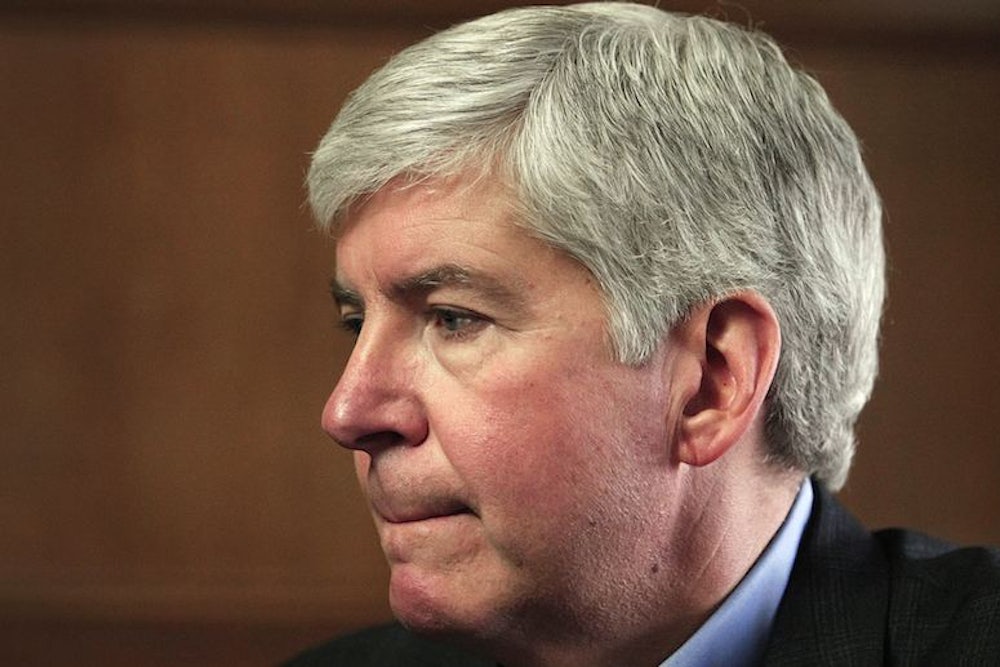Most of the Obamacare press coverage on Monday was about a pair of polls—one from the Pew Center for the People and the Press, the other from NBC News and the Wall Street Journal. Obamacare detractors seized on the fact that majorities said they disapproved of the law—and that opposition to the law seemed, if anything, to be growing. Obamacare defenders quickly pointed out that only a minority seemed to support the Republcan position, which is to wipe the law off the books. Even among opponents, about half prefer that public officials work on fixing the law’s shortcomings.
Both the detractors and the defenders had a point. But the biggest news on Monday wasn’t about Obamacare’s poll numbers. It was about Obamacare’s reach. And there the news was much clearly better. In Michigan, Republican Governor Rick Snyder signed a bill that will expand the state’s Medicaid program, as Obamacare envisions. The signing was the culmination of a long, difficult effort by Synder and a bipartisan, statewide-coalition to overcome Tea Party resistance. “This is about the health of fellow Michiganders,” Snyder said. In Pennsylvania, Republican Governor Tom Corbett announced that he would no longer block a similar Medicaid expansion, as long as the state legislature enacts a version of the expansion that fits his policy specifications.
That last part is important: As in several other states, among them Michigan, Corbett wants to modify Medicaid so that it requires more payments from beneficiaries and requires the unemployed to show proof they are seeking a job. Jeffrey Young of the Huffington Post has the details and it’s hard to know, right now, whether Corbett’s demands will be more than the Obama Administration—which would have to issue a waiver—would go along. In situations like these, advocates for low-income groups worry that the restrictions officials would place on Medicaid would make it impractical, or harm people the program is supposed to help. The concern is well-founded.
But the two sides will negotiate, as frequently happens now when states wish to modify their Medicaid programs, and most observers I know think the result will be expansion spreading—not just to Michigan and Pennsylvania, but later to states like Ohio, where another Republican governor, John Kasich, wants to do something similar. And that suggests we’ve hit a critical milestone. As Sarah Kliff noted in the Washington Post on Monday, “if the Pennsylvania expansion does go through, it would be the 26th state to expand Medicaid, meaning that the majority of states had decided to opt into a massive health law provision that the Supreme Court decision last year accepted.”
Expansion in Michigan and Pennsylvania would also mean a few hundred thousand additional Americans get health insurance. And while that’s important primarily for how it will help those people, it’s also a reminder of how public feelings about Obamacare may change with time.
Greg Sargent got Pew to give him a breakdown of exactly which voters oppose the law so much they want officials to make it fail: Sure enough, it’s Tea Party Republicans. As Greg notes, this voting bloc is highly influential within Republican Party politics, particularly as primary voters: That goes a long way to explaining why congressional Republicans are threatening to shut down the government or allow default if Obama won’t agree to delay or defund the law.
But support for such extreme positions doesn’t extend much outside this group. Meanwhile, it turns out that many people opposed to (or at least ambivalent about) the law simply don’t know much about it. Many also have no health insurance, which means they stand to benefit most dramatically and immediately. This is consistent with previous polling, which showed that people supported the provisions of Obamacare but not the law itself. It’s also consistent with the present media reality: With most of the law's coverage provisions not yet in place, the law's critics are able to dominate the political conversation.
Does that mean public opinion on Obamacare will change markedly once the law is in place—and lots of these people start getting insurance coverage, sometimes for the first time and sometimes with the help of substantial financial assistance? Does it mean a push to delay or defund Obamacare, even if it means government shutdown or debt ceiling calamity, is sure to backfire? My own record on these predictions is pretty mediocre—opposition to the law has proven more resilient than I ever imagined—so I'm not sure my opinion counts for much. But Ed Kilgore knows a thing or two about politics. And he seems optimistic:
All in all, the defunders/delayers are representing a minority of a slim majority that is very likely to shrink in the months ahead. Perhaps they are truly motivated by their own conviction that the law will enslave Americans and wreck the economy. But if they are counting on a political bonanza outside their own ranks, they are definitely cruising for a bruising, and that’s without even taking into account the additional beating they’ll take for disproportionate blame in shutting down the government or risking a debt default.
Jonathan Cohn is a senior editor at the New Republic. Follow him on twitter @CitizenCohn
